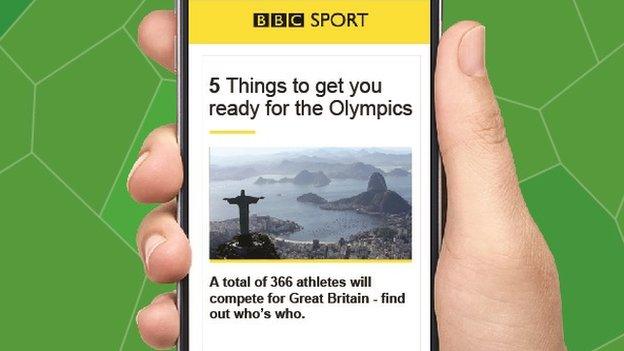Rio Olympics 2016: Four years on from London, can Yorkshire triumph again?
- Published
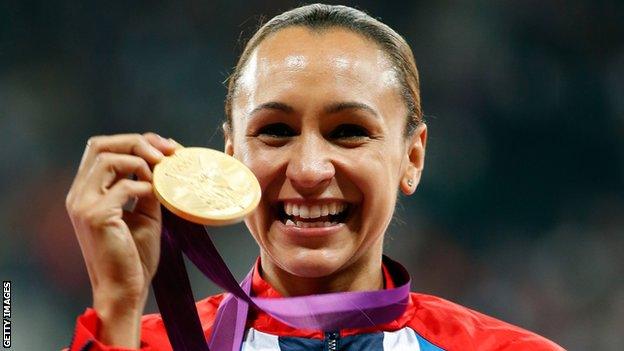
Jessica Ennis-Hill took gold in the heptathlon at London 2012 with a lifetime-best 6,955 points
Olympic Games on the BBC |
|---|
Hosts: Rio de Janeiro Dates: 5-21 August Rio time: BST -4 |
Coverage: Watch on BBC One, BBC Two, BBC Four, Red Button and up to 24 HD video streams on mobile, desktop, connected TVs and app, plus follow on Radio 5 live and via live text commentary. |
Following Friday's opening ceremony at the Maracana Stadium, the Olympic Games in Rio are now in full swing, with 10,500 athletes representing a record 207 teams in action during the next fortnight.
But what if one of those teams was a single county in the north of England?
Four years ago, Yorkshire's athletes were leading Team GB to a record medal haul, and would have finished 12th if it were an individual country - ahead of Jamaica, Brazil and Spain among many others.
Further medals in the Paralympics, including two golds for wheelchair sprinter Hannah Cockroft, capped off a brilliant sporting summer for the White Rose.
With London 2012 now a distant memory, what legacy has Yorkshire been left with?
Declining participation
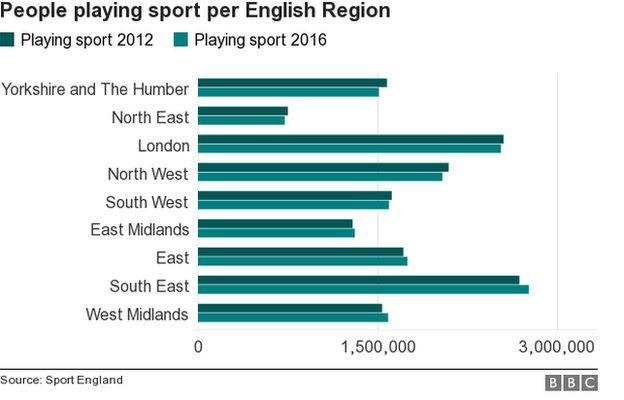
Recent BBC analysis showed that despite Great Britain and Northern Ireland's success in London, there are 8,700 fewer people who now play sport or exercise once a week than there were in 2012.
Participation in Yorkshire and the Humber fell by 1.7%, the steepest decline in the country, with Doncaster the worst-affected area as it saw a fall of 13.2%.
Those figures are in spite of a number of events being introduced to the region since 2012.
The Tour de Yorkshire was seen by over 1.2 million people in its inaugural year in 2015, the World Triathlon Series visited Leeds for the first time in June and the First Direct Arena in Leeds has provided a home for high-profile boxing bouts.
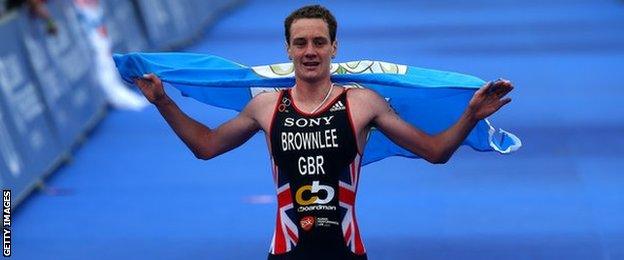
Leeds has hosted several major sporting events since 2012, including the UK leg of the World Triathlon Series
Despite the statistics for the county as a whole, the leader of Leeds City Council believes holding these major events has inspired her city.
Councillor Judith Blake said: "One of the biggest aspects of bringing the Tour de France to Leeds was legacy, but we couldn't anticipate how much the communities engaged in the event.
"It unleashed a phenomenal pride in Yorkshire and gave an opportunity to showcase to the world what a fabulous county we are - it also did an incredible amount for confidence in the region.
"The Tour de France, Tour de Yorkshire and the Leeds Triathlon have really contributed to Leeds being regarded and recognised as one of the most active cities in England."
'Unprecedented' cuts
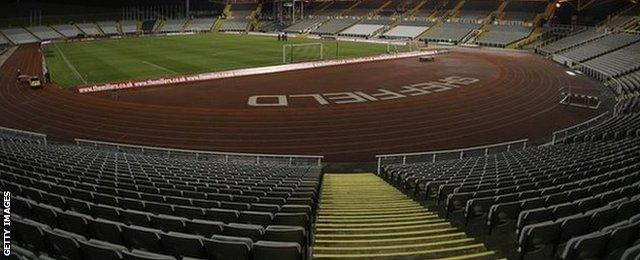
The 25,000-capacity Don Valley Stadium closed in 2013, with an Olympic Legacy Park built on the old site
In all six sports where Yorkshire athletes won medals at London, funding has gone up, with triathlon seeing a 29% increase in investment.
Sheffield's Don Valley Stadium was knocked down in 2013 and the athletics track torn up, but a £3.5m basketball arena will be built in its place at the 35-acre Olympic Legacy Park, which will also house a 3G pitch for rugby league side Sheffield Eagles and a research centre for sport.
"There's some major performance centres based in and around us in Sheffield," explained Lorenzo Clark of Sheffield International Venues, which is responsible for the facilities where some of South Yorkshire's leading athletes train.
"Yes, they are supported financially, but I think there's further potential for Sheffield to compete to be one of the key centres for sport in the UK."
Sport England say that investment from local councils in sport has fallen by £389m since 2010, with Sheffield City Council claiming "unprecedented" cuts to council budgets was forcing them to find alternate sources of funding from external agencies.
"There's a whole range of indicators where we don't get our fair share in funding. It's not just sport - it's transport, it's culture," added Blake.
"It's a major challenge - we have conversations with the elite athletes, who tell us how much more we could do with better facilities."
Yorkshire's top hopefuls for Rio
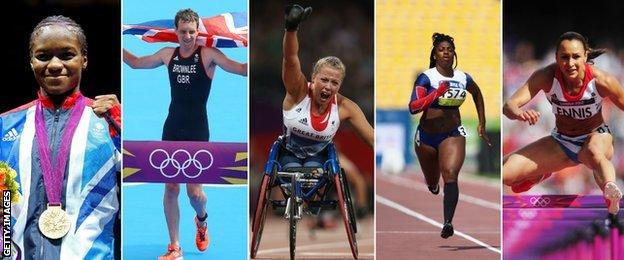
Nicola Adams, Leeds: The top seed in her division at Rio, Adams is hoping to retain her Olympic title in women's flyweight boxing.
The Brownlee brothers, Leeds: Probably Yorkshire's most famous sporting family, Alistair Brownlee took gold at London 2012, with brother Jonny winning bronze.
Hannah Cockroft, Halifax: A double gold-winner in 2012, Cockroft will aim to retain her 100m T34 title and look to repeat her 2015 World Championship victories in the 400m and 800m events.
Kadeena Cox, Leeds: Cox is bidding to become the first British athlete to win medals in two sports at the same Paralympics since 1988, having been selected in both the athletics and cycling squads.
Jessica Ennis-Hill, Sheffield: Ennis-Hill has missed a number of tournaments since taking Heptathlon gold in 2012 through pregnancy and injuries, but she became world champion in 2015 and has recorded the second best score in the world this year.
A bright future for the region?
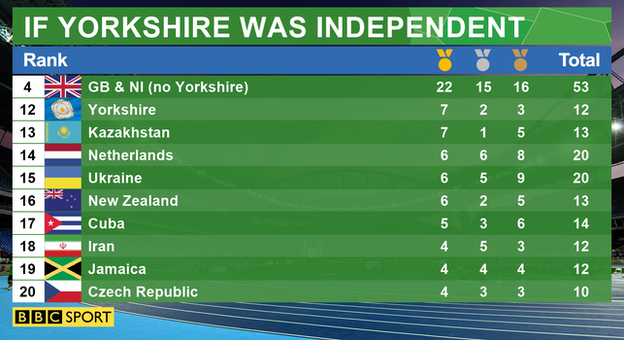
With even greater success predicted for Great Britain in Rio, how can the county ensure the legacy of London 2012 is carried over in the build-up to Tokyo 2020 and beyond?
"I'm always going to say we need more money and better facilities in the county," said former Sport Minister Richard Caborn, who is now chair for the Olympic Legacy Park in Sheffield.
"Let's get the elites working with their local clubs - that doesn't happen as effectively as it could do, and that's a real challenge.
"If people feel they can be the next Nicola Adams then it's inspirational, that's what Olympic legacy is all about."
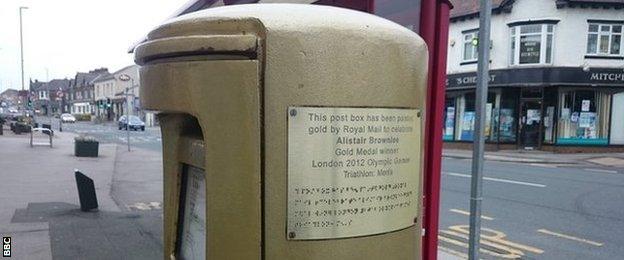
London 2012 champions had post-boxes painted gold in their honour, such as this one in Alistair Brownlee's hometown of Horsforth in Leeds
UK Sport rules mean money is distributed to sports according to their chances of winning medals - something Blake feels could be reconsidered.
"Funding is so closely linked to elite performance," she told BBC Sport.
"After Rio, I think we need to look at how we can make the funding regimes work for us to encourage more participation from young people coming through."
Subscribe to the BBC Sport newsletter, external to get our pick of news, features and video sent to your inbox.
- Published18 August 2016

- Published3 August 2016

- Published19 July 2016
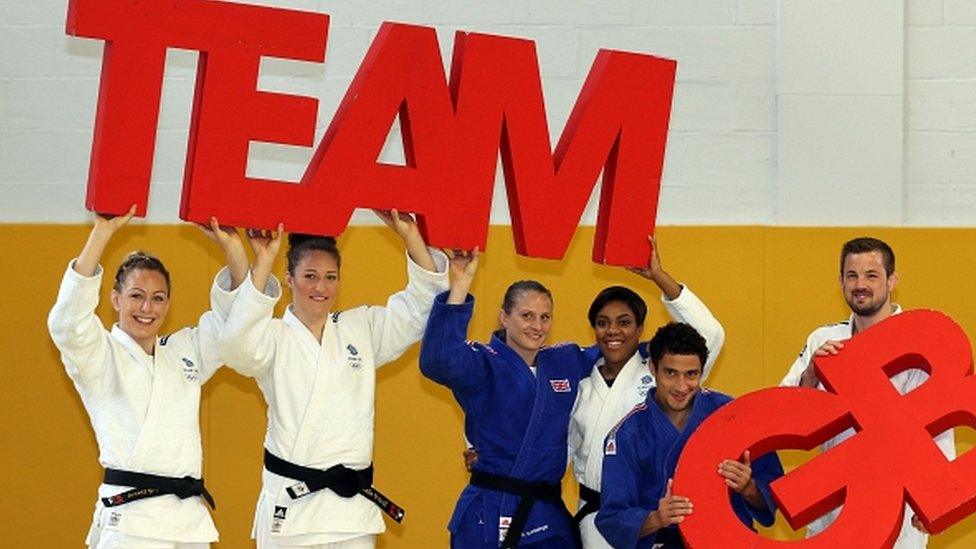
- Published3 August 2016
